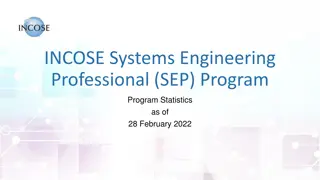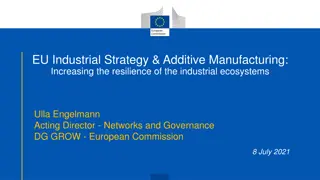
Industrial Strategy Focus: Pillars for LEP Priorities
Exploring the key pillars of the Industrial Strategy focusing on LEP priorities, including investing in research and innovation, developing technical skills, and upgrading infrastructure. Discover how these pillars align with the strategic objectives set forth by the LEP board for regional growth and development.
Download Presentation

Please find below an Image/Link to download the presentation.
The content on the website is provided AS IS for your information and personal use only. It may not be sold, licensed, or shared on other websites without obtaining consent from the author. If you encounter any issues during the download, it is possible that the publisher has removed the file from their server.
You are allowed to download the files provided on this website for personal or commercial use, subject to the condition that they are used lawfully. All files are the property of their respective owners.
The content on the website is provided AS IS for your information and personal use only. It may not be sold, licensed, or shared on other websites without obtaining consent from the author.
E N D
Presentation Transcript
Building Our Industrial Strategy LEP Board Meeting 15thFebruary 2017
Building Our Industrial Strategy Green Paper published on 23rd January Consultation on developing a new Industrial Strategy Consultation closes 17thApril 2017 (Easter Monday!) LEP to produce a response on behalf of the sub-region
The 10 Pillars Strategy identifies10 pillars which the Government believes are important to drive forward the strategy and frame its approach Four pillars of particular relevance to the LEP in the context of the SEP refresh
Resonance with LEP priorities Investing in science, research and innovation : UKRI will develop and deliver a clear strategy from fundamental research through to business innovation Potential to create new research institutions to back local strengths in world-class research or drive forward priority technologies (such as battery technology, energy storage and grid technology linked to electric vehicles) Building a pipeline of talent for an innovative economy Creation of Industrial Strategy Challenge Fund Links to Cheshire Science Corridor
Resonance with LEP priorities Developing skills Strong emphasis on development of technical skills and provision of higher level technical qualifications. Reforms to FE into a new system of technical education New Institutes of Technology in all regions though possibly city-based Better use of data and intelligence to identify and address industry skills needs Acknowledges need to incentivise business to invest in skills development alongside public sector investment. Links between skills and variances in regional productivity Highlights importance of supporting lifelong learning and availability of good quality careers advice Digital Economy Bill potential for free basic digital skills training to those adults in England who need it
Resonance with LEP priorities Upgrading infrastructure Acknowledges importance of better connectivity in supporting higher growth and living standards. This includes good digital infrastructure. Infrastructure investment unlocks private sector investment including housing Potential for new Public Private Partnerships to give private sector a role in delivering infrastructure Need to better match infrastructure to local plans and to support local growth
Resonance with LEP priorities Delivering affordable energy & clean growth Government role to fund basic energy research which is too long term for the market to deliver: ultimately though it will be the private sector that drives the low carbon economy Need to ensure the shift to a low carbon economy is done in a way that minimises the costs to UK businesses, taxpayers and consumers Highlights the roll out of electric vehicles as a driver in ensuring that the grid is smart and resilient to new demands Commitment to a programme of research and innovation in energy storage and other smart technologies. Potential to position Cheshire and Warrington as a focal point for this research
Creating the Right Institutions In addition to the four pillars previously highlighted, Green Paper identifies the importance of creating the right institutions to bring together sectors and places Includes local business and finance institutions, leadership institutions, interest groups and advocacy groups, institutions that support innovation (including universities and science parks / innovation districts), cultural, sporting and quality of life institutions and connectivity institutions (ports and airports) Includes explicit reference to LEPs and their role in delivering local growth, giving businesses a direct role in shaping the future of their local communities . Raises point of learning from best practice and working with local areas to identify and help develop local specialisms, putting place the right institutions with the right powers to help support local areas of economic strength
Responding to the Consultation The LEP should lead the Industrial Strategy debate in Cheshire and Warrington We should aim to hold a couple of business-focused engagement events to facilitate this Our response to the consultation should: - Remind government of the means by which we think our economy should grow Note the alignment with our SEP Note the opportunities for us to align ourselves with the Green Paper (e.g. energy systems, Institutes of Technology) Identify any gaps in government s thinking
Industrial Strategy The Ten Pillars: Key Points and Consultation Questions
New Commitments Increasing research and development investment by 4.7bn in total including creation of a new Industrial Strategy Challenge Fund. Reviewing the case for a new research institution to act as a focal point for work on battery technology, energy storage and grid technology Commissioning independent research on approaches to commercialisation in different institutions Seeking to harness the potential of the UK s home-grown inventors Reviewing how to maximize the incentives created by the Intellectual Property System including pilot IPO representative for Northern Powerhouse Set out a UK Measurement Strategy Questions for Consultation What should be the priority areas for science, research and innovation investment? Which challenge areas should the Industrial Strategy Challenge Fund focus on to drive maximum economic impact? What else can the UK do to create an environment that supports the commercialisation of ideas? How can we best support the next generation of research leaders and entrepreneurs? How can we best support research and innovation strengths in local areas?
New Commitments Creating a proper system of technical education 170m of capital funding towards creation of new Institutes of technology to deliver higher technical education in STEM subjects Exploring how to support FE colleges to be centres of excellence in teaching maths and English Improving information for learners interested in a technical education Improving the take up of maths including seeking partners to open specialist mathematics schools Work towards a joined-up, authoritative view of sector specific skills gaps Publication of comprehensive careers strategy Explore new approaches to encourage lifelong learning Taking action to address differences in skills levels between different areas Questions for Consultation What more can we do to improve basic skills? How can we make a success of the new transition year? Should we change the way that those resitting basic qualifications study, to focus more on basic skills experience? Do you agree with the different elements of the vision for the new technical education system set out here? Are there further lessons from other countries systems? How can we make the application process for FE colleges and apprenticeships clearer and simpler, drawing lessons from the HE sector? What skills shortages do we have or expect to have, in particular sectors or local areas, and how can we link the skills needs of industry to skills provision by educational institutions in local areas? How can we enable and encourage people to retrain and upskill throughout their working lives, particularly in places where industries are changing or declining? Are there particular sectors where this could be appropriate?
New Commitments Using infrastructure to support rebalancing [however Government will continue to prioritise the highest value-for-money projects] Supporting key road investments (including the M60 North West Quadrant) Support other major infrastructure investments, including: Connected and autonomous vehicles Local transport Questions for Consultation Are there further actions we could take to support private investment in infrastructure? How can local infrastructure needs be incorporated within national UK infrastructure policy most effectively? What further action can we take to improve the performance of infrastructure towards international benchmarks? How can the government work with industry to ensure we have the skills and supply chain needed to deliver strategic infrastructure in the UK?
New Commitments Working with the British Business Bank (BBB) to build understanding of the obstacles to firms accessing capital outside of London and the South East Minister for Small Business (Margot Jones MP) will take on a new role of Scale-up Champion will include working with LEPs, Growth Hubs, the ScaleUp Institute and other partners Explore how government-held data can be used to identify scale-up businesses Build on the success of the BBB and work with the Business Growth Fund and other private partners to raise awareness of equity funding and increase the supply of finance for growing businesses Look at ways to support the development of B2B ratings and feedback platforms Review into entrepreneurship to assess the support currently available and consider international best practice Questions for Consultation What are the most important causes of lower rates of fixed capital investment in the UK compared to other countries, and how can they be addressed? What are the most important factors which constrain quoted companies and fund managers from making longer term investment decisions, and how can we best address those factors? Given public sector investment already accounts for a large share of equity deal in some regions, how can we best catalyse uptake of equity capital outside the South East? How can we drive the adoption of new funding opportunities like crowdfunding across the country? What are the barriers faced by those businesses that have the potential to scale-up and achieve greater growth, and how can we address those barriers? Where are the outstanding examples of business networks for fast growing firms which we could learn from or spread?
New Commitments Rolling out a balanced scorecard approach across all major central government construction, infrastructure and capital investment projects over 10 million Trial different aspects of designing and gathering supplier feedback in public sector procurement Questions for Consultation Are there further steps that the Government can take to support innovation through public procurement? What further steps can be taken to use public procurement to drive the industrial strategy in areas where government is the main client, such as healthcare and defence? Do we have the right institutions and policies in place in these sectors to exploit government s purchasing power to drive economic growth?
New Commitments Building future trading relationships. Creating a new more active Team UK approach to winning overseas contracts, with the government helping convene consortia of companies to back a single UK bid for major overseas projects. Developing a new, more strategic approach to inward investment. DIT will review learning from successful inward investment promotion agencies across the globe (reporting 2017). Government will also consider whether there should be a greater emphasis on the effect of investment projects on growth. Working with behavioral insights experts to improve targeting of potential exporters Exploring how to maximize opportunities that a UK presence at existing trade fairs could offer for businesses Questions for Consultation What can the Government do to improve our support for firms wanting to start exporting? What can the Government do to improve support for firms in increasing their exports? What can we learn from other countries to improve our support for inward investment and how can we measure its success? Should we put more emphasis on measuring the impact of Foreign Direct Investment on growth?
New Commitments Setting out in 2017 a long-term road map to minimise business energy costs Commissioning a review of the opportunities to reduce the costs of achieving our decarbonisation goals in the power and industrial sectors Reviewing the opportunities for growth from the energy sector and the opportunities for the UK Publication of an Emissions Reduction Plan during 2017, providing long-term certainty for investors. Review the case for a new research institution to act as a focal point for work on battery technology, energy storage and grid technology (reporting in early 2017) Questions for Consultation What are the most important steps the Government should take to limit energy costs over the long term? How can we move towards a position in which energy is supplied by competitive markets without the requirement for ongoing subsidy? How can the Government, business and researchers work together to develop the competitive opportunities from innovation in energy and our existing industrial strengths? How can the Government support businesses in realising cost savings through greater resource and energy efficiency?
New Commitments The Government welcomes work on early sector deals (in life sciences, ultra low emission vehicles, industrial digitisation and creative industries) Sector deals will be open to all and the Government is prepared to work with any sector that can organise behind strong leadership to address shared challenges and opportunities Questions for Consultation How can the Government and industry help sectors come together to identify the opportunities for a sector deal to address especially where industries are fragmented or not well defined? How can the Government ensure that sector deals promote competition and incorporate the interests of new entrants? How can the Government and industry collaborate to enable growth in new sectors of the future that emerge around new technologies and new business models?
New Commitments The Government will use additional infrastructure funding to unlock growth in areas where connectivity is holding it back The Government will take account of the varying infrastructure needs and opportunities in different regions Deliver major infrastructure improvements which will drive growth across the country (including Midlands rail Hub and Northern Powerhouse rail) We will work with local areas to test approaches to closing the skills gaps We propose creating competitive new funding streams to back the clusters of innovative businesses across the country. These could support and develop world-class research and innovation strengths in local economies, and provide commercialization funding to allow universities to work more with local businesses We will work with local areas to identify and help industrial and economic clusters of businesses and local specialisms Questions for Consultation Do you agree the principles set out 9in relation to driving growth across the whole country) are the right ones? If not what is missing? What are the most important new approaches to raising skill levels in areas where they are lower? Where could investments in connectivity or innovation do most to help encourage growth across the country/
New Commitments (1) Where appropriate maximise the benefit that anchor companies can bring to an area by developing new policies to support the growth of UK supply chains DIT will review how it identifies priority investments, including with reference to the impact they can make in local areas where productivity needs to catch up. Government will consider the role it can play in attracting investment to the regions Cabinet Office are reviewing the location of government agencies and arms-length bodies, and will consider relocating them where they could potentially help reinforce a local cluster and support private sector growth Recognising the importance of cultural and sporting institutions in making different places attractive to people and firms Government will review whether there is more that can be done to leverage government and research council laboratories to drive local growth Questions for Consultation Recognising the need for local initiative and leadership, how should we best work with local areas to create and strengthen key local institutions? What are the most important institutions which we need to upgrade or support to back growth in particular areas? Are there institutions missing in certain areas which we could help create or strengthen to support local growth?
New Commitments (2) Government will support networks of universities where they want to come together to improve commercialisation Government will work with the British Business Bank and ScaleUp Institute to understand and address the relative weakness of venture capital funding and entrepreneurship networks outside the South East Work with local government to review how to bring more business expertise into local governance, and improve links between councils and the private sector Explore further devolution deals with the largest cities LGA will work with new Mayoral Combined Authorities to build up administrative capacity Work with LEPs to review their role in delivering local growth , and examine best practice and how we can strengthen them, including extending the support they receive from the What Works centre for Local Economic Growth Questions for Consultation Does the Green paper identify the right areas of focus? Are the ten pillars suggested the right ones to tackle low productivity and unbalanced growth? If not, which areas are missing? Are the right central government and local institutions in place to deliver an effective industrial strategy? If not, how should they be reformed? Are the types of measures to strengthen local institutions set out in the Green Paper the right ones? Are there important lessons that can be learned from the industrial policies of other countries which are not reflected in the ten pillars?
Industrial Strategy Challenge Fund - Challenge Areas Bioscience & Biotechnology Increase UK self-reliance in food, energy and materials production. Leading Edge Healthcare & Medicine Improve patient outcomes through cutting-edge, personalised therapies and new antimicrobials and establish the UK as a world leader in the development and commercialisation of cell and gene therapies. Manufacturing & Materials of the Future Ensure that the UK leads the world in the sustainable manufacturing and delivery of the next generation of products and components. New Energy Technologies Become the global lead in solving the energy challenge of supplying clean, affordable energy securely to ever more-demanding societies around the world. To create UK economic wealth, and an economy that works for everyone, by overcoming challenges using next generation quantum technologies in areas such a sub-surface imaging, GPS-free navigation, advanced sensing and communications. Quantum Technologies To create UK economic wealth, and an economy that works for everyone, by overcoming challenges using RAI technologies in areas such as hazardous environments, autonomous transport, health & social care and advanced decision making with AI. Robotics and Artificial Intelligence (RAI) Space and Satellite Technologies To create UK economic wealth, and an economy that works for everyone, by overcoming challenges using satellite-based technologies in areas such communications, navigation and earth observation. Transformative Digital Technologies To create UK economic wealth, and an economy that works for everyone, by overcoming challenges using digital technologies such as data, AI/ML, cyber security, immersive, HPC, modelling and 5G. Integrated & Sustainable Cities Establish the world s best smart city demonstrator, introducing 5G technologies and applications, attracting global mobile companies to the UK. Technologies for the Creative Industries To create UK economic wealth, and an economy that works for everyone, by overcoming challenges to anchor and grow the UK creative sector and its contribution to wealth generation and society.





















